Good Tuesday. I am again running behind, this is the third time I have tried to finish this post. It was my intent to write this two Friday’s ago but time got away from me. I am now trying to read at the pace that I am writing because I forget things as time goes on. In this case, I read this chapter about a month ago. I wrote down some key concepts so that it would jog my memory when I came back but I essentially have to reread again.

This chapter has Winston writing in his diary. He clearly is torn between the right/wrong dichotomy. He is recollecting treasonous events and thoughts but is unable to rectify human emotion and permitted behavior.
The themes in this chapter center on what we learn is a former marriage. Winston at one time had a wife named Katherine. It appears that the focus of marriage was on creating children for the purposes continuing the empire of Big Brother. Because Winston wanted more out of the relationship than just procreation, he became dissatisfied in the union and Katherine disappeared, status unknown.
Love- Orwell is strongly suggesting that love is a necessary human emotion. Despite having a willing wife for the mechanical aspects of sex, it is not enough to fulfill the complete emotion. Winston was turned off to Katherine if you will because he had no connection. They didn’t share the same interests or even the same goals in life. I suppose that you would call it loneliness.
Prostitutes– Despite knowing the risks and the fact that it was wrong, Winston still had a rendezvous with a prostitute from the proletariat. This behavior is probably driven by loneliness and the fact that Winston spends a long time celibate. I think the point here is that despite all the potential downsides, strict adherence to the laws is impossible when you try to isolate human emotions.
Not having a lot of experience or research in this area, I would say that this chapter re-enforces the long held understanding that totalitarian societies often permit minor discretions despite the fact that activity may be illegal. Think free trade in China or the black market in the USSR. As long as the activity is not perceived as harming the establishment then there is only selective enforcement.
Even in the worst of situations, life continues. Babies are born, commerce happens and jobs get done. The scale and focus may changed but not necessarily the drive for life. I would say that points to the fact that there are characteristics like emotions that make us human whether they are good ideas or not.
Recent Comments